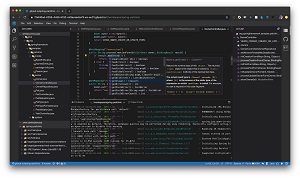News
Eclipse Foundation Unveils 'True Open Source' VS Code Alternative, Theia 1.0
The Eclipse Foundation unveiled Eclipse Theia 1.0, described as a "true open source" alternative to Microsoft's wildly popular Visual Studio Code editor.
Started by Ericsson and TypeFox in 2016 and backed by early contributions and adoption by industry heavyweights like Google Cloud, IBM, Red Hat and SAP, Eclipse Theia provides web-tech software that can be used to create multi-language cloud and desktop IDEs.
A news release was distributed early on that said Theia could create such IDEs "that avoid the fees associated with VS Code," but that "fees" reference was removed from a "final" news release, a spokesman told Visual Studio Magazine. Nevertheless, at the time of this writing, the fees question was the top-most comment ("What fees are they talking about?") on a post announcing Theia on the developer-oriented social site, Hacker News.
The VS Code FAQ says it's "free for private or commercial use, pointing to the product license for details.
 [Click on image for larger view.] Theia (source: Eclipse Foundation).
[Click on image for larger view.] Theia (source: Eclipse Foundation).
The new project's site says "Unlike other 'open-source' projects, projects hosted at an Open-Source Foundation are protected against single-vendor decisions against the interest of the diverse community," pointing to more information about the Eclipse development process. The foundation is best known for its namesake open-source IDE, which just hit version 4.15 a few days ago.
The foundation listed the main differences between Theia and VS Code thusly:
- Theia's architecture is more modular and allows for significantly more customizations
- Theia is designed from the ground to run on both Desktop and Cloud
- Theia is developed under the community-driven and vendor-neutral governance of the Eclipse Foundation.
Like VS Code and other editors/IDEs, it relies heavily on extensions (and can use VS Code extensions) and uses the the Language Server Protocol to provide the "smarts" -- or intelligent editor support (IntelliSense in the Microsoft camp) -- for programming languages including JavaScript, Java, Python and many more. Although Theia can use existing VS Code extensions, only Microsoft products can access the VS Code marketplace, so the foundation has created Eclipse Open VSX: A Free Marketplace for VS Code Extensions.
The IDE's dual ability to create native desktop applications or alternatively work in a browser with a remote server is enabled by architecture that provides two separate frontend and backend processes, using JSON-RPC messages over WebSockets or REST APIs over HTTP for communication.
"Both the frontend and backend processes have their dependency injection (DI) container to which extensions can contribute," the foundation said. "Similar to VS Code's online marketplace for code extensions, Eclipse Theia 1.0 also has a marketplace that is available today and, in the spirit of true open source community, allows for even non-VS Code applications to use these extensions."
Also like VS Code, Theia features an integrated terminal and layout customization.
Gunnar Nilsson, an open source strategist at co-creator Ericsson, said in a statement: "Eclipse Theia is an extensible open source platform for creating and maintaining custom IDE and IDE-like applications. A huge benefit of Theia is that it allows developers to start with a desktop application and easily transition it to run in the cloud without having to rewrite it. Having a truly open source solution is why we helped to start this project more than three years ago. We're very pleased that the Eclipse Foundation has helped us guide this first official release and look forward to many more in the years to come."
About the Author
David Ramel is an editor and writer at Converge 360.